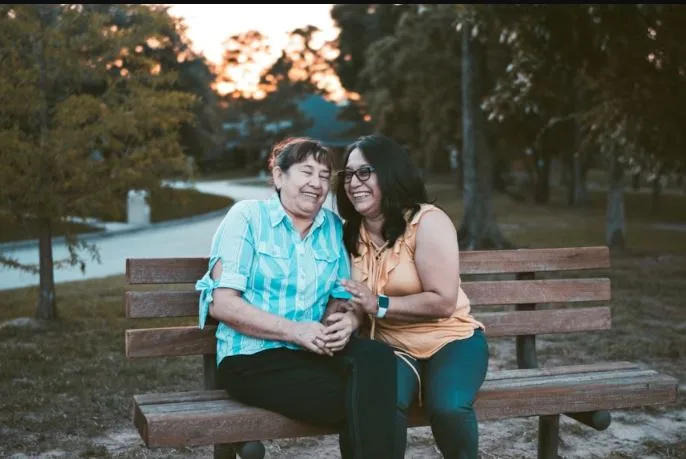The Complete Mental Health Guide for Families and Caregivers Managing Home Care
Very seldom does Hollywood get the Alzheimer’s battle right. When it does, the progressive brain disorder is depicted as a metaphorical dark cloud hovering over its victim, waiting to consume. It becomes a feral animal feeding on fear and confusion.
The 2014 movie Still Alice is a tragic story of a linguistics professor struggling to come to terms with her diagnosis. But it’s the helplessness of her three children as they watch their mother slowly slip into a purgatory.
No other generation is as affected by this affliction as the sandwich generation. Aged between 40 and 60, many have their work, care for their parents, and their own families.
Business Insider reports that one in four American adults belongs to the sandwich generation, nearly a 50% increase since 2015. And it’s become a deeply personal issue for celebrities. Seth Rogen’s recent Apple TV documentary, Taking Care, chronicles the challenges of caregiving in a raw and honest take.
Once you’re on the emotional rollercoaster called home care, there’s no “off” button. The mental health load is enormous. Learning how to manage it will save your sanity.
Unexpected Grief
Jennifer Fink was her mother’s caregiver for 20 years.
She tells Verywell Mind that no one warned her about the “anticipatory grief” she’d feel. Describing it as a sorrow felt over a long time, you know the loss will come eventually.
Anticipatory grief is common in cases where the disease takes a long time to run its course. Many caregivers and close family members watch their loved ones’ decline over several years.
Fink says that for some, it’s slow and for others, fast. Yet, both are equally horrible. The only solace is the emotional preparation that comes with it.
Practical Support
Nobody can do this alone, no matter how strong you think you are. Caregiver burnout is not to be taken lightly. In his book, An Exercise in Uncertainty, cancer patient Jonathan Gluck shares the heavy load his wife carries as his primary caregiver.
One morning, at 2 a.m., Didi was rushed to the ER, complaining of excruciating back pain. Nursing him during his illness had finally caught up with her. She was diagnosed with bulging L5 and L6 discs. Only then did they realize his spouse needed help.
Senior caregiver services are more than a respite. Professional caregivers are a lifesaver for families caught between caring for their elderly loved ones and themselves.
You want the best for your sick family member while they maintain their dignity and agency. Caring With Integrity Home Care explains that these services provide compassionate, personalized elder care in the comfort of their homes. Find out about care plans and Medicare benefits on government programs.
Setting Boundaries
We cannot stress this enough. The unbearable weight of taking on everything has disastrous consequences for your well-being.
Mental Health America suggests that you must be in a good emotional space to be the best version of yourself in your caregiving duties. Set healthy boundaries by taking a time out and asking others to help with caregiving. Hire a home health aide for respite care.
Boundary setting goes both ways. You don’t have to commit to taking on everything for your loved one. Encourage them to handle their personal care and independence by bathing themselves if they are physically able to.
And remember, it’s acceptable to say no when asked to do something that requires more of your time and mental capacity.
Find Your Community
Guilt is a complex emotion. You tell yourself it’s wrong to have negative feelings of despair and frustration. And then the guilt sets in.
Other family caregivers who find themselves in the same boat will tell you it’s normal. But you have to hear it out loud so you can assure yourself that you’re not being selfish. This is why joining a support group is important.
Listening to others speak about their caregiving journeys can be a cathartic experience. It also lets you know that you’re not alone, notes Healthline. There’s something profoundly healing about being in a room of strangers who can relate to you. It’s called community.
Another option is to join a caregiving chat group. Other caregivers are only too happy to offer support and advice.
Take Care of You
Forgetting to eat or not attending social events are the first signs of caregiver burnout.
Make a conscious effort to include nutrient-dense meals in your diet. They improve energy and stamina. Take regular 10-minute breaks, even if it’s a walk outdoors for some fresh air.
Diarize meet-ups with friends and stick to your plans. Isolating yourself is the worst thing you can do. Maintain your relationships, and be intentional about checking in with others.
Most importantly, take care of yourself by doing activities that bring you joy. Exercise, get enough sleep, and pay attention to your needs. And if it all becomes too much, consider a skilled nursing facility that provides expert health care, physical therapy, and nutritious meals.




